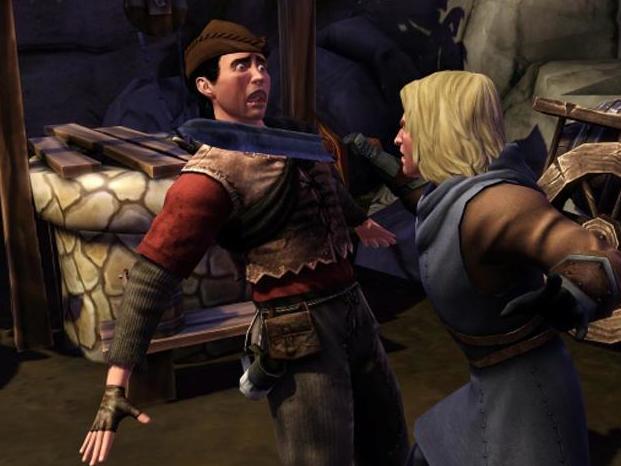20 years of The Sims: How EA’s ‘toilet game’ became a global mega-hit
Will Wright’s unlikely triumph let people play God – and introduced a whole new audience to the world of video games, writes Louis Chilton


Your support helps us to tell the story
From reproductive rights to climate change to Big Tech, The Independent is on the ground when the story is developing. Whether it's investigating the financials of Elon Musk's pro-Trump PAC or producing our latest documentary, 'The A Word', which shines a light on the American women fighting for reproductive rights, we know how important it is to parse out the facts from the messaging.
At such a critical moment in US history, we need reporters on the ground. Your donation allows us to keep sending journalists to speak to both sides of the story.
The Independent is trusted by Americans across the entire political spectrum. And unlike many other quality news outlets, we choose not to lock Americans out of our reporting and analysis with paywalls. We believe quality journalism should be available to everyone, paid for by those who can afford it.
Your support makes all the difference.In hindsight, it seems inevitable that The Sims would be a hit. The video game franchise that gave players total dominion over the lives of their digital characters – the ability to manage everything from sleeping habits to wallpaper patterns – has earned EA, its publisher, over $5bn (over £3.8bn) in sales, and is currently the highest-selling PC franchise in history. But back in 2000, before its release, its creators were bracing themselves for failure.
The mastermind behind The Sims was Will Wright, a Georgia-born game designer who had made his name in 1989 with the release of SimCity. Wright’s background was hardly the typical route towards game design: his most notable early achievement was winning the US Express in 1980, an illegal cross-country street race in the vein of the Cannonball Run. Wright initially struggled to find a publisher for SimCity, a non-linear city-building game that bucked the goal-oriented conventions of the medium. Determined to publish it himself, he co-founded the gaming company Maxis with Jeff Braun in 1987.
SimCity proved a seminal game, selling nearly two million copies when it was ported to the SNES console. Other less-successful simulation games followed, such as SimFarm and SimCopter, and in 1997, Maxis was bought out by EA – just in time for Wright’s next big project. If SimCity let gamers play city planner, then The Sims would go one step further – and let people play God.
Many who worked at Maxis were sceptical of The Sims’ commercial potential. It was conceived as a game with no real objective, with an unprecedented focus on the minutiae of day-to-day life. Players would guide their characters (known as “sims”) through their lives, making sure they are fed, washed, entertained and employed. Internally, it was referred to by some at Maxis as “the toilet game”, a barbed nod to the game’s laughably unglamourous toilet-cleaning and bladder-emptying mechanics. At a time when games were making great strides in graphics and gameplay, inching towards a more immersive, cinematic sensibility, it’s easy to see why The Sims was regarded as a bad idea. Rather than drawing from Hollywood, Wright took inspiration from a classic children’s toy: the game would be, in essence, a digital dollhouse.
Unlike a real dollhouse, however, The Sims appealed to just about everyone, adults and children alike. Wright had laid the groundwork with SimCity, which played a huge role in reshaping the perception of video games within the industry: from being a kid-focused hobby to a viable product for adults. This newly emerging demographic represented a great opportunity – and The Sims was primed to seize it. Shortly after it launched, on 4 February 2000, it was obvious that the sceptics were wrong. The Sims rapidly became a best-seller, and over the next few years spawned a host of expansion packs, which added themed characters, items and features to the base game, and in 2003 it was ported to the Xbox, PlayStation 2 and GameCube consoles. Three sequels would follow, as well as high-concept spinoffs (like The Sims Medieval) and mobile versions.
Back then, gaming was also seen as a male-dominated market, a notion The Sims completely shook up. Some of the forward-thinking features – most significantly the ability for sims to engage in same-sex relationships – added to the game’s inclusive, made-for-everyone feel. Even though kids weren’t the sole market for the game, they still constituted a large portion of its playerbase. For parents, it was a game they knew they could buy for their children without having to worry about video game violence (a topic that had surfaced with particular intensity in the wake of the 1999 Columbine High School shooting, which was perpetrated by students who played violent games). The Sims touched on matters like death, and sex, but the tone was always light and euphemistic. It’s hard to imagine a game less likely to scandalise.
Another group that The Sims managed to win over – the elusive demographic essential in elevating a game from modest hit to total sensation – is non-gamers. The Sims made itself a go-to choice for people who never normally play video games. It practically encouraged the use of cheat codes, a leniency that opened up the game’s full possibilities without the need for any pre-existing aptitude. Inputting “rosebud” (a playful nod to Citizen Kane) to the cheat bar, for example, gave the players immediate injections of cash. If you wanted to scrimp and organise, build their sims’ lives with the challenge of a budget, you could. But for anyone who wanted to, the option was there to just sit back and take it easy.
Another reason The Sims is still so popular after all these years is its sizable modding community. “Modding” – adding to or altering the game’s code to insert new elements or features – had been popular since Doom in 1993, and people found the Sims games rich with possibilities. For some, this just means creating more realistic faces, or custom tattoos, or Game of Thrones-themed furniture. For others, this can mean a more radical renovation of the gameplay, with some of the more risqué mods for Sims 4 adding features like illegal drug-use and pornographic sex animations.

Twenty years have passed since The Sims was first released, and the world of video games now looks vastly different. But not all that much has changed for The Sims. The graphics have improved, although The Sims 4, the franchise’s current iteration, looks pretty cartoonish and run-of-the-mill when compared to what else is out there. The basic Sims interface has grown increasingly complex, giving users a greater selection of careers, hobbies, interests, speech interactions, you name it. But it’s never altered the feel of the gameplay.
Thankfully, The Sims 4 has remained true to the progressive spirit of the original, and has continued to move forward: for the first time, it allows players to create transgender sims, with separate, individually alterable options for gender, voice pitch, bathroom use and whether or not a sim can become pregnant. It is still far from perfect – there is no recognition of non-binary gender identities, for instance, or of people with disabilities – but the significance of such a high-profile game being trans-inclusive can hardly be understated. There is no analogue in the world of cinema; it is depressingly inconceivable to imagine, say, a Fast & Furious film where queer characters are given equal footing as straight, cisgendered ones. The Sims offers hope that this will not always be the case.
For all that it tries to simulate real life, there is something oddly inhuman about The Sims. In boiling down every idle pastime to a quantifiable skill value, every social interaction to a little “social metre” boost, the games never really probe what it means to be alive. But then, maybe this is part of the magic. The Sims is a fantasy of control; it allows us to imagine an ordered world where wealth and happiness are just a few clicks from God's finger away. With the real world so often consumed by chaos and frustration, you could hardly ask for a better escape.
Join our commenting forum
Join thought-provoking conversations, follow other Independent readers and see their replies
Comments